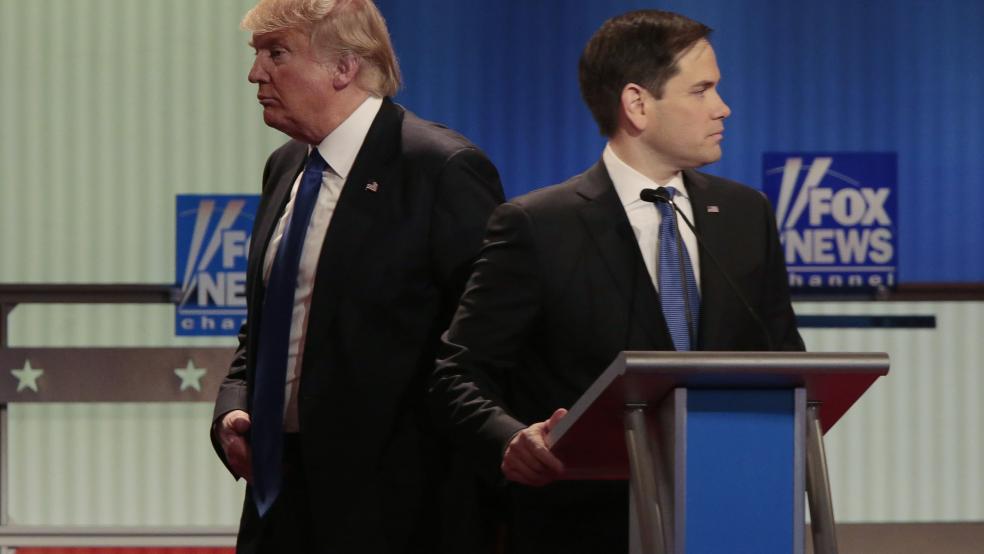Billionaire Donald Trump repeatedly complains about the $19 trillion national debt and vows to slash government spending to bring the budget under control if he is elected president.
During Thursday night’s nationally televised GOP presidential debate from Detroit, Trump was pressed by Fox News moderator Chris Wallace to explain how he would approach that challenge even as his proposed tax cuts would add an estimated $10 trillion to the national debt over the coming decade.
Related: Trump: A Perfect Storm of Voter Rage, Reality TV and Social Media
As he has done before, Trump insisted he could achieve much of his savings without touching mushrooming entitlement programs such as Social Security and Medicare by simply going after “waste fraud and abuse.” But after pressing Trump for specific examples of how he would achieve those savings, Wallace ruefully concluded, “Mr. Trump, your numbers don’t add up.”
Trump said he would achieve much of his savings by dismantling the Department of Education and the Environmental Protection Agency and phasing out the Common Core educational standards programs.
“We’re bringing education locally,” Trump explained as some of his supporters in the audience cheered him on. “The Department of Environmental Protection, we are going to get rid of it in almost every form. We’re going to have little tidbits left. But we’re going to take tremendous amounts out.”
“We have various other things,” he added. “If you look at every single agency, we can cut it down, and I mean really cut it down – the waste, fraud and abuse -- that’s massive.”
Related: After Stumbling Badly Over Health Care, Trump Now Has a Plan
Trump for months has gotten away with boasts and hyperbole in explaining how he would reform the government and achieve massive savings through hard bargaining and the elimination of government waste. Only recently have debate moderators and his chief Republican rivals, Sens. Ted Cruz of Texas and Marco Rubio of Florida, pressed him for more specificity, such as how precisely he would go about replacing Obamacare or convincing Mexico to pay for construction of a wall along the U.S.-Mexico border.
Last night Wallace directly challenged Trump on his government savings claims. He did it by calling up on a TV monitor a chart showing that the Education Department’s total annual budget is $78 billion, including Pell grants for low-income college students and aid to states for special education, while the EPA spends just $8 billion a year. Total annual cost to taxpayers: $86 billion.
“The deficit this year is $544 billion – that’s more than a half trillion dollars,” Wallace said. “Your numbers don’t add up.”
Trump tried to squirm out of his numbers bind, quickly shifting the discussion to the high price of drugs and the fact that the pharmaceutical industry is not mandated by the government “to bid properly” to hold down costs. In fact, Medicare is prohibited by law from negotiating lower drug prices for seniors – a problem that many including Democratic presidential candidates Hillary Rodham Clinton and Sen. Bernie Sanders of Vermont have complained about.
Related: Could a Conservative Backlash Wipe Out Leading Republicans?
“You have hundreds of billions of dollars in waste,” Trump insisted. “We don’t bid properly. We don’t have proper bidding procedures. The reason we don’t is because they take care of all of the senators, all of the congressmen, and they don’t bid.”
At that point, Wallace called up a second chart, this one challenging Trump’s claim that Medicare, if authorized, could negotiate $300 billion a year in savings on drug prices. The problem with that, Wallace noted, is that Medicare spends only $78 billion a year on all drugs for seniors.
Trump essentially was proposing to save nearly four times as much on drugs as Medicare actually spends in a year. But the billionaire insisted he had been misunderstood. The $300 billion of savings wouldn’t come just from tougher negotiations over drug prices, but from cracking down on government contractors across the board.
“We’re going to buy things for less money,” Trump declared. “I’m not just talking about drugs; I’m talking about other things. We will save more than $300 billion a year if we properly negotiate. We don’t do that. We don’t negotiate anything.”





